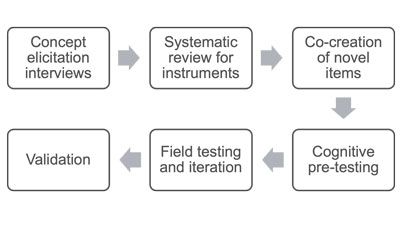Geriatric Emergency Medicine
Measuring GEM outcomes
The quality of acute healthcare for older people living with frailty, including Geriatric Emergency Medicine, has traditionally been measured using service metrics. These are typically automated and include admission rates, lengths of stay, and adherence to time targets. These outcomes are easy to measure but are not meaningful to older people.
This research aims to capture meaningful outcome goals using Patient-Reported Outcome Measures (PROMs) and is led by Dr James van Oppen. The programme of PROM development and validation is scheduled for completion in 2023.
Defining what concepts should be measured
We first interviewed people during or after emergency care episodes to classify their healthcare outcome goals into themes. All participants were aged over 65 and were living with mild to very severe frailty. Our sample demographics broadly represented the Leicester City population.
Goals were classified as "Autonomy" (information, control, and security) and "Functioning" (physical, psychosocial, and symptom relief):
- Lay report
- Academic report in BMC Geriatrics
- Reflections on conducting qualitative GEM research during Covid-19 restrictions
Identifying instruments
We identified existing PROMs which have been used by older people with acute illness. Following review of face validity by lay members of the Leicester, Leicestershire, and Rutland Patient and Public Involvement Forum, we recommended four instruments as potentially suited to GEM applications:
- COOP/WONCA charts
- EuroQol EQ-5D
- McGill Quality of Life Questionnaire (Expanded)
- Palliative care Outcome Scale
These instruments all focused on the "Functioning" themes identified earlier. There was inadequate consideration of “Autonomy” themes.
Preparing novel items
We worked with Lay Research Partners to devise an exhaustive list of novel "Autonomy" items and to select the best performing of the "Functioning" instruments.
We recruited a further sample of patient participants in acute care settings for cognitive interviews. Here, we evaluated performance to test and improve the questions, yielding nine draft items.
- Academic report in Journal of Patient Experience
Field-testing and validating the PROM
The preliminary “PROM-OPAC” instrument (Patient-Reported Outcome Measure for Older People with frailty receiving Acute Care) was administered with EQ-5D-5L in two field-testing phases and a final validation study. In total, some 350 older people participated during their care at eight UK hospitals.
Academic manuscripts are currently under peer review. PROM-OPAC is provided free of charge under a Creative Commons license.
